|
|
|
Sort Order |
|
|
|
Items / Page
|
|
|
|
|
|
|
| Srl | Item |
| 1 |
ID:
115733
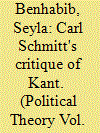

|
|
|
|
|
| Publication |
2012.
|
| Summary/Abstract |
Carl Schmitt's critique of liberalism has gained increasing influence in the last few decades. This article focuses on Schmitt's analysis of international law in The Nomos of the Earth, in order to uncover the reasons for his appeal as a critic not only of liberalism but of American hegemonic aspirations as well. Schmitt saw the international legal order that developed after World War I, and particularly the "criminalization of aggressive war," as a smokescreen to hide U.S. aspirations to world dominance. By focusing on Schmitt's critique of Kant's concept of the "unjust enemy," the article shows the limits of Schmitt's views and concludes that Schmitt, as well as left critics of U.S. hegemony, misconstrue the relation between international law and democratic sovereignty as a model of top-down domination. As conflictual as the relationship between international norms and democratic sovereignty can be at times, this needs to be interpreted as one of mediation and not domination.
|
|
|
|
|
|
|
|
|
|
|
|
|
|
|
|
| 2 |
ID:
085422
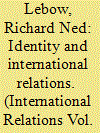

|
|
|
|
|
| Publication |
2008.
|
| Summary/Abstract |
Drawing on Kant and Hegel, debates in political theory and international relations generally assume that an identity cannot be created without the simultaneous creation and negative stereotypy of an `other'. Figures such as Schmitt and Huntington accept and even welcome this binary, while others, among them Nietzsche, Habermas and Rawls, look for ways of overcoming it. Drawing on Homer's Iliad and psychological research, I challenge the assumptions on which Kant and Hegel, and their successors, build their argument.
|
|
|
|
|
|
|
|
|
|
|
|
|
|
|
|
| 3 |
ID:
178692
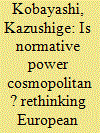

|
|
|
|
|
| Summary/Abstract |
Despite the apparent consensus that European Union (EU) normative power embodies a Kantian cosmopolitan approach to world politics, such a consensus is typically presupposed by scholars, rather than being critically examined by them. By offering macro-historical reflections, this article argues that EU normative power deviates from the Kantian cosmopolitan ideal and in fact replicates the Hobbesian logic of normative homogenization. Renouncing the medieval Vatican’s ambition to construct a united Europe anchored in uniform normativity, Kantian theory celebrates multiple normalcy as the basis for human freedom, perpetual peace, and mutual transformation. In contrast, Hobbesian theory is driven by the conviction that a peaceful value-based community could be built only through normative homogenization, behavioural conformism, and moral unity. In Hobbesian theory, the Leviathan exercises a transformative power to socialize others, eliminate discords, and build a commonwealth through norm diffusion and public education. In this vein, the EU’s aspiration to build a normatively homogenous Europe seems to reflect Hobbes’s vision of normative unity, rather than Kant’s vision of cosmopolitan diversity. Should the EU aspire to pursue a cosmopolitan foreign policy, it needs to pay more attention to the power-political implications of its drive toward normative homogenization and shift its focus from socialization to mutual transformation.
|
|
|
|
|
|
|
|
|
|
|
|
|
|
|
|
| 4 |
ID:
112421
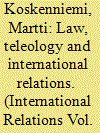

|
|
|
|
|
| Publication |
2012.
|
| Summary/Abstract |
Interdisciplinary approaches often bemoan international law's lack of theoretical sophistication and naïve utopianism. Instead of offering effective tools of governance, it seems committed to outdated ideas about an international public realm and a dubious teleology of progress. This essay - given as the E. H. Carr lecture at the University of Aberystwyth in 2011 - reviews efforts to reform international law into a science and a more efficient instrument of international rule. Such efforts have been a part of international law's internal development but their lack of success depends on a mistaken view of the field as a 'discipline' - a set of theoretical or technical propositions. This essay defends a view of international law as an argumentative practice in which political claims are defended and attacked, rather than as a governance tool or institutional blueprint. At its worst, law may buttress bureaucratic privilege. At its best it may offer, for a cynical world, a vocabulary for imagining better futures. It may also sharpen political thought and strategic awareness, but it cannot replace them.
|
|
|
|
|
|
|
|
|
|
|
|
|
|
|
|
| 5 |
ID:
074798


|
|
|
|
|
| Publication |
2006.
|
| Summary/Abstract |
Immanuel Kant is today often invoked as an emblematic figure for Europe. In works by thinkers such as Zygmunt Bauman, Jacques Derrida, Michel Foucault and Jürgen Habermas, among others, Kant's work stands as a core reference for discussions of the European Modern and the legacy of the Enlightenment, even if this appropriation is not uncritical. The spectre of Kant also haunts Europe in more pedestrian understandings of the ideal. Prominent politicians such as Gerhard Schroeder, Joschka Fischer, Dominique de Villepin and Romano Prodi have all paid tribute to his influence, while in a variety of popular-academic texts Kant's 'cosmopolitical' dream has been invoked as a paradigm for Europe - if not a shorthand for the European social model tout court.
|
|
|
|
|
|
|
|
|
|
|
|
|
|
|
|
| 6 |
ID:
119272
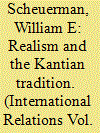

|
|
|
|
|
| Publication |
2012.
|
| Summary/Abstract |
In contemporary international political theory, 'Cosmopolitanism' is typically juxtaposed to 'Realism', with many varieties of the former building on Kantian moral and political ideals, and the latter presumably rejecting Kant and his aspiration for far-reaching global reform. In agreement with a growing body of scholarship that seeks to challenge conventional views of Realism, this essay attends to the surprisingly complex views of the Kantian legacy (including Hans Kelsen, perhaps the most important neo-Kantian international thinker in the last century) within its ranks. Not all Realists have been unambiguously critical of Kant, and when in fact they have criticized him, they have done so for many different reasons. First-generation Realists (e.g. E. H. Carr, John Herz, Hans Morgenthau, Reinhold Niebuhr, Frederick Schuman and Georg Schwarzenberger) offered an ambivalent reading of Kantianism consistent with their endorsement of the ultimate desirability of major alterations to the global status quo, whereas second-generation Realists (i.e. Henry Kissinger and Kenneth Waltz) tended to read Kant so as to transform him into a forerunner of their own anti-reformist and institutionally conservative versions of Realism. An examination of Realism's rendezvous with Kantianism not only helps draw a more differentiated portrayal of Realism than is still found in much scholarship, but it also helps us understand how Realism dramatically changed within a relatively short space of time during the immediate postwar decades. It also points to some important potential starting points for a more fruitful exchange between Cosmopolitans and Realists.
|
|
|
|
|
|
|
|
|
|
|
|
|
|
|
|
|
|
|
|
|